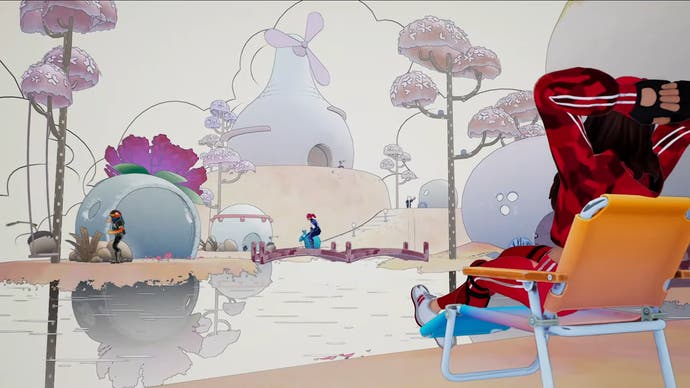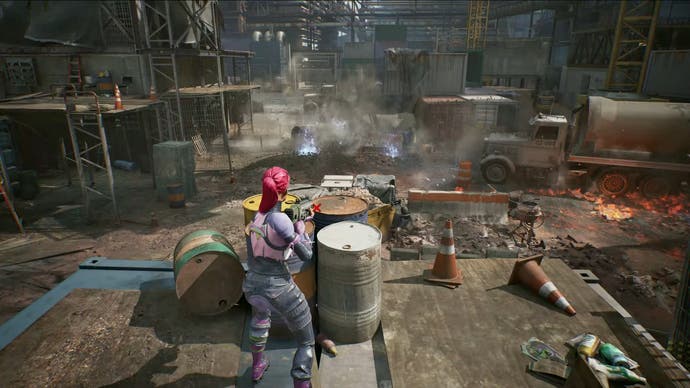Epic unveils Unreal Engine advancements, Hellblade tech demo, ability to publish directly into Fortnite
"Fortnite is becoming an ecosystem."
Epic Games has held its latest State of Unreal presentation, during which it demoed new features for Unreal Engine 5.2, fresh peeks at Unreal Engine games such as NCSoft's Project M and Ninja Theory's Hellblade sequel, plus a live demo of Fortnite's brand new UE5-powered creative mode.
Oh, and Tim Sweeney gave his thoughts on the concept of an "open metaverse", which he predicted would arrive in the next decade.
Today's presentation began with a look at new procedural generation technology being baked into UE 5.2, which will allow developers to build a small section of an open-world environment, from which Unreal Engine can then build out a much larger area at scale. A demo video showed how components can be switched out on the fly, with elements such as a bridge adapting automatically to the environment around.
Metahuman, Epic's impressive technology to build digital humans, is getting an upgrade named Metahuman Animator, which can quickly turn performance capture from an iPhone video into an Unreal Engine-powered in-game asset.
Hellblade actress Melina Juergens took to the stage to show off a live demo of that, and how it was being used by Ninja Theory in the development of Senua's Saga Hellblade 2 - you can see that above.
Later this year, Epic will merge its various game asset libraries into a single interface, blending together Quixel Megascans, ArtStation, Sketchfab, Unreal Engine Marketplace into... Fab. Designed for use with all game engines, it will fully launch later this year and include asset packs from game developers such as Supermassive Games (with a Dark Pictures pack), or celebrities such as Fortnite collaborator Marshmello, with an 88/12 percent revenue split.
Speaking of Fortnite, today was the day we finally saw Epic Games' brand new creative toolset for the title, which will allow Unreal Engine 5 projects to be published directly into the hugely-successful game.
"We've been working towards this moment for a very long time... Fortnite is becoming an ecosystem," Epic Games said. "That means new tools to design, develop and publish games, and a new economy that rewards developers. These updates bring us one step closer to Epic's vision of a connected metaverse with billions of players enjoy high-quality creations made by millions of developers.
"At the centre of this all is Unreal Editor for Fortnite, available today in public beta on Epic Games Store. It's a new PC application that brings the power of Unreal Engine to the scale of the Fortnite audience, deeply integrated with the game with new workflows that PC and all other platforms to create together, fast and fluid. We call it UEFN for short."
Already, Fortnite players spend 40 percent of their play time with creator-made experiences, amounting to billions of hours each year. Now, those experiences can include UE5-powered additions, with UEFN due to get the full Unreal Editor toolset over time, including Fab assets and Metahumans.


An eye-catching feature shown off by Epic today was the ability for someone editing a UEFN experience on PC to play in real-time with those on console, testing out the game live while changes were made.
Epic Games also announced the Fortnite "Creator Economy 2.0", a plan to share some of the billions of dollars in revenue it makes from Fortnite's Item Shop. 40 percent of that money is now earmarked for third-party development teams building in UEFN, based on various engagement metrics.
Reflecting on the birth of a potential metaverse, Tim Sweeney totalled up Fortnite's 70 million monthly active users, Roblox's 250 million and Minecraft's 100 million with those also playing things like Apex and PUBG Mobile to total around a billion players by the end of the decade.
NFTs and VR goggles may be part of the metaverse in future, but they're not required, Sweeney said. More likely to be included are elements already present in games, he continued, such as being able to hang out with friends, or attend virtual concerts.
The future of this medium isn't Epic's work, but those of independent creators, Sweeney added, with the help of UEFN and Epic Games Store as ways to get these creations in the hands of players.
Sweeney compared the state of app stores today with that of computing systems in the earliest days of the internet, as open standards emerged. His vision is one of an "open metaverse" in the future, which connects different console ecosystems and publishers, and where consoles are "metaverse browsers".
Sweeney concluded by predicting Unreal Engine 6 would launch within the next decade, and usher in that "open metaverse". Until then, it will be "built live" with the tools described today.





